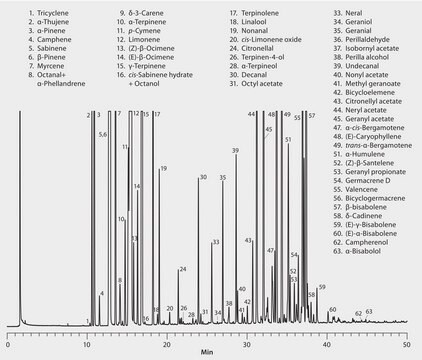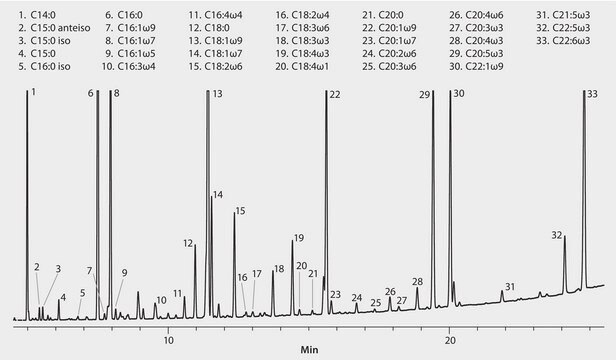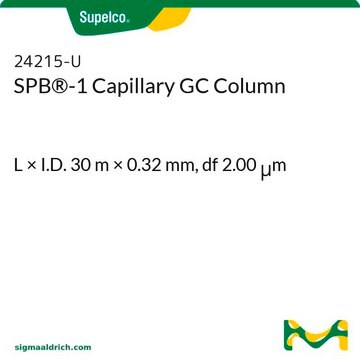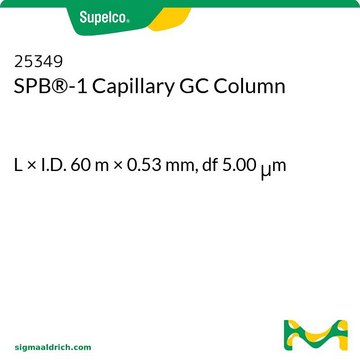Wszystkie zdjęcia(1)
Kluczowe dokumenty
24028
SPB®-1 Capillary GC Column
L × I.D. 30 m × 0.25 mm, df 0.25 μm
Zaloguj sięWyświetlanie cen organizacyjnych i kontraktowych
About This Item
Kod UNSPSC:
41115710
eCl@ss:
32119290
Polecane produkty
Materiały
fused silica
Poziom jakości
agency
meets requirements for USP G1, G2, and G9
Parametry
-60-320 °C temperature (isothermal or programmed)
Wartość beta
250
df
0.25 μm
metody
gas chromatography (GC): suitable
dł. × śr. wewn.
30 m × 0.25 mm
grupa aktywna macierzy
Bonded; poly(dimethyl siloxane) phase
typ kolumny
capillary non-polar
Szukasz podobnych produktów? Odwiedź Przewodnik dotyczący porównywania produktów
Powiązane kategorie
Opis ogólny
Application: This column is often used for traditional general purpose applications, where a non-polar column is required. Analytes will be separated primarily according to boiling point.
USP Code: This column meets USP G1, G2, and G9 requirements.
Phase:
USP Code: This column meets USP G1, G2, and G9 requirements.
Phase:
- Bonded
- Poly(dimethyl siloxane)
- ≤0.32 mm I.D., <2 μm: -60 °C to 320 °C (isothermal or programmed)
- ≤0.32 mm I.D., ≥2 μm: -60 °C to 300 °C (isothermal or programmed)
- ≥0.53 mm I.D., <2 μm: -60 °C to 300 °C (isothermal) or 320 °C (programmed)
- ≥0.53 mm I.D., ≥2 μm: -60 °C to 260 °C (isothermal) or 280 °C (programmed)
Zastosowanie
SPB®-1 Capillary GC Column was used for speciation of the nitrogen compounds (quantitatively), which are polar and somewhat basic in nature, with chemiluminescence detection.
Inne uwagi
We offer a variety of chromatography accessories including analytical syringes
Informacje prawne
SPB is a registered trademark of Merck KGaA, Darmstadt, Germany
Ta strona może zawierać tekst przetłumaczony maszynowo.
Kod klasy składowania
10 - Combustible liquids
Klasa zagrożenia wodnego (WGK)
WGK 1
Temperatura zapłonu (°F)
214.0 °F - closed cup
Temperatura zapłonu (°C)
101.1 °C - closed cup
Wybierz jedną z najnowszych wersji:
Masz już ten produkt?
Dokumenty związane z niedawno zakupionymi produktami zostały zamieszczone w Bibliotece dokumentów.
Klienci oglądali również te produkty
C B'Hymer
Journal of chromatographic science, 45(6), 293-297 (2007-07-14)
An automated static headspace gas chromatographic method for the determination of residual solvents in the bulk drug substance alpha-phenyl-1-(2-phenylethyl)-piperine methanol, a serotonin 5-HT2 receptor antagonist, is evaluated. The method includes the use of 1-propanol as an internal standard. The gas
C B'Hymer
Journal of chromatographic science, 46(5), 369-374 (2008-05-22)
A static headspace gas chromatographic method is developed and evaluated for the quantitation of residual 2-propanol, methanol, and toluene in bulk (2alpha, 6alpha, 8alpha, 9alpha beta)-octahydro-3-oxo-2,6-methanon-2H-quinolizin-8-yl-1H-indole-3-caboxylate methanesufonate hydrate, a serotonin 5-HT3 receptor antagonist drug compound. This method is accurate and
Y Matsuzaki et al.
Yakugaku zasshi : Journal of the Pharmaceutical Society of Japan, 111(10), 617-620 (1991-10-01)
Gomisin A (TJN-101) is one of the lignan components isolated from Schisandra Fruits. A high sensitive and precise method for the determination of TJN-101 and its major metabolite (Met. B) in the rat serum was developed by selected ion monitoring
O S Fedianina
Genetika, 46(3), 332-339 (2010-04-16)
Tubulin-folding cofactor D is necessary for the assembly of tubulin heterodimers and, possibly, plays additional roles in the cell. The effects of cofactor D, microtubules, and/or tubulin dimers on the mitosis initiation were studied in Schizosaccharomyces pombe. It was found
J M Santiuste et al.
Journal of chromatography. A, 1002(1-2), 155-168 (2003-07-30)
The chlorinated organic compounds are very important from the point of view of the chemical industry and environmental protection, and therefore the gas chromatographic analysis of these compounds is very interesting for analytical chemists. In this paper we studied the
Global Trade Item Number
| SKU | GTIN |
|---|---|
| 24028 | 4061833662267 |
Nasz zespół naukowców ma doświadczenie we wszystkich obszarach badań, w tym w naukach przyrodniczych, materiałoznawstwie, syntezie chemicznej, chromatografii, analityce i wielu innych dziedzinach.
Skontaktuj się z zespołem ds. pomocy technicznej







